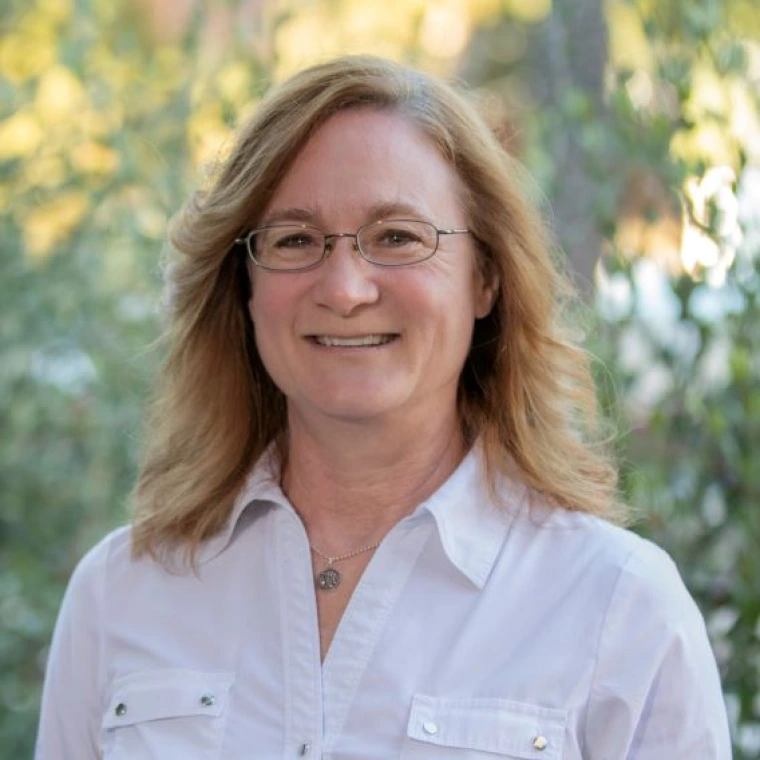Josephine Korchmaros

Dr. Korchmaros is Director of the University of Arizona’s Southwest Institute for Research on Women (SIROW). Since earning her doctoral degree in Social Psychology with a focus on quantitative research methods in 2003, Dr. Korchmaros has developed, implemented, evaluated, and provided training and technical assistance for multiple grant-funded research projects of importance to populations experiencing health disparities. Her research has focused on treatment models; reduction of risk behaviors; addressing health disparities; and system and policy improvement in such areas as sexual health, substance use, and justice-involvement.
Dr. Korchmaros takes a research-to-practice focus, aiming to:
- disseminate research findings in a timely manner using multiple mediums and outlets;
- increase the extent to which practice is informed by research; and
- encourage policy change and funding programs informed by current research and knowledge.
She has produced peer-reviewed research briefs, trainings, papers, implementation tools, and presentations concerning accurate identification of service need within populations experiencing health disparities, effectively addressing such need, and health-related behavior change.
Dr. Korchmaros also has extensive experience conducting and assisting others to conduct community tailored and responsive intervention and research. She has developed theoretically-based health-related behavior interventions for different communities and has informed the field about the particular influencing factors related to health-related behavior in particular communities. Finally, Dr. Korchmaros’ work has informed the field about the practice of implementing tailored and responsive intervention and research.
Select Projects
Current
Comprehensive Evaluation of an Innovative Collaborative Response to the Opioid Epidemic
Pima County Adolescent Substance Abuse Treatment Program - Nuevo Camino (New Path)
New Dawn - Warrior Women
MI-CARE: Pharmacist-CHW team to improve medication adherence and reduce hypertension disparities
Improving Hypertension Medication Adherence for Older Adults
Digital Technology to Support Adherence to Hypertension Medications for Older Adults with Mild Cognitive Impairment
Project Lifeline: A Comprehensive Approach to Suicide Prevention on a Large, Southwestern Urban Campus
Select Completed
U-MATTER (Unified Medication Assisted Treatment Targeted Engagement Response)
Safe Haven – A program providing medication-assisted treatment (MAT) opioid use disorder (OUD) assessment, assessment of co-occurring disorders, and recovery support services
Bridges to Wellness (B-Well)
Developing a Sustainable Seafood Industry Infrastructure in Burma
Medication Adherence, Health Literacy and Cultural Health Beliefs in a Massachusetts Community Health Center
National Cross-site Evaluation of Juvenile Drug Courts
Select Publications
Korchmaros, J. D., Murphy, S., & Greene, A. (2024). Effectiveness of The Seven Challenges® for adults: It’s not just because of self-disclosure. Journal of Social Work Practice in the Addictions. https://doi.org/10.1080/1533256X.2023.2301706
Greene, A, Korchmaros, J. D., Davis, M., Sargus, T., & Preston-Haynes, F. (2023). Building capacity to implement sexual health risk and substance use disorder prevention services in adolescent behavioral health treatment: A case study. Children and Youth Services Review, 155, 1-10. https://doi.org/10.1016/j.childyouth.2023.107152
Shaw, S. J., Totman, M. S., Huebner Torres, C., Lee, J. K., Gavrilyuk, D., & Korchmaros, J. K. (2023). Cultural and translation challenges in assessing health literacy among immigrants from the former Soviet Union. Health Promotion International, 38, 1-11. PMID: 37796105; DOI: 10.1093/heapro/daad103
Greene, A, Korchmaros, J. D., & Frank. F. (2023). Trauma experience among women who have substance use disorders and are homeless or near homeless. Community Mental Health Journal, 60, 233-243. https://link.springer.com/article/10.1007/s10597-023-01162-6
Greene, A, & Korchmaros, J. D. (2023). A research-informed approach to providing behavioral healthcare to women with extensive trauma histories. Community Mental Health Journal, 60, 203-207. https://link.springer.com/article/10.1007/s10597-023-01159-1
Greene, A, Korchmaros, J. D., Kagan, R., Ostlie, E., & Davis, M. (2022). From referral to treatment: Implementation processes in Juvenile Drug Treatment Court programs. Youth Justice. https://doi.org/10.1177/14732254221122625
Greene, A, & Korchmaros, J. D. (2022). Engaging parents and caregivers of system-involved youth in a sexual health intervention. Child and Youth Services Review, 37, https://doi.org/10.1016/j.childyouth.2022.106451.
Haring, R. C., Blanchard, J. W., Korchmaros, J. D., Lund, J. R., Haozous, E. A., Raphaelito, J., Hudson, M., & Tsosie, K. S. (2021). Empowering equitable data use partnerships and indigenous data sovereignties amid pandemic genomics. Frontiers in Public Health, 11, https://doi.org/10.3389/fpubh.2021.742467
Korchmaros, J. D., Greene, A., & Murphy, S. (2020). Implementing trauma-informed research-supported treatment: Fidelity, feasibility, and acceptibility. Child and Adolescent Social Work Journal 38, 101-113. https://doi.org/10.1007/s10560-020-00671-7.
Korchmaros, J. D. (2018). The Seven Challenges® Comprehensive Counseling Program: Effectiveness for adults with substance use problems. Journal of Drug Issues, 48, 590-607.
Korchmaros, J.D., Thompson-Dyck, K. L., & Haring, R.C. (2017). Professionals’ perceptions of and recommendations for matching juvenile drug court clients to services. Children and Youth Services Review, 73,149-164.
Korchmaros, J. D., Baumer, P. C., & Valdez, E. S. (2016). Critical components of adolescent substance use treatment programs: The impact of Juvenile Drug Court: Strategies in Practice and elements of Reclaiming Futures. Drug Court Review, 10, 80-115.
Korchmaros, J. D., Ybarra, M. L., & Mitchell, K. J. (2015). Adolescent online romantic relationship initiation: Differences by sexual and gender identification. Journal of Adolescence, 40, 54-64.
Korchmaros, J. D., Ybarra, M. L., Langhinrichsen-Rohling, J., boyd, danah, & Lenhart, A. (2013). Perpetration of teen dating violence in a networked society. Cyberpsychology, Behavior, and Social Networking, 16, 561-567. PMID: 23790358.

